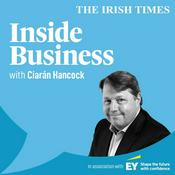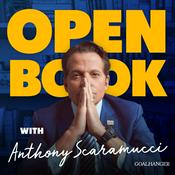629 episodes
Could Simon Harris’s savings scheme for the ‘middle classes’ prove to be a sound investment?
18/2/2026 | 38 mins.Tánaiste and Minister for Finance Simon Harris announced a plan this week to introduce a new savings scheme to unlock the €170 billion that people here are keeping in mostly low-yield bank deposit accounts.
His plan is to devise a scheme that generates good returns for savers in a way that puts the money on deposit to better use in the economy.
Cliff Taylor of The Irish Times covered the story this week, he joins host Ciarán Hancock in studio to assess how such a scheme might work and what might be on the table come budget time.
In the second half of this episode, we discuss how visitor numbers to Ireland were down last year, the weather in 2026 has been lousy so far and the country has been getting a reputation as a high-cost location for a holiday.
On the flip side of the coin, the Government has decided to scrap the passenger cap at Dublin Airport and has eased rules that would have banned short term holiday lets in rural locations.
Eoghan O’Mara Walsh is chief executive of the Irish Tourism Industry Confederation and joined Ciarán on the line to discuss the issues facing the tourism industry this year and its likely asks of Government in the next budget.
And with St Patrick’s Day on the horizon and it being the typical starting point of the Irish tourism season, how is the year ahead shaping up for the industry?
Produced by John Casey with JJ Vernon on sound.
Hosted on Acast. See acast.com/privacy for more information.- First up on this week’s episode of Inside Business, we look at new research this week from Revolut suggests that social media companies made €32 million in revenue from scam ads to Irish users in 2025. The figure for Europe as a whole was a whopping €4.4 billion.
Host Ciarán Hancock is joined by Irish Times reporter Hugh Dooley to takes us through the headline findings from the Revolut research, while Irish Times columnist and economist David McWilliams discusses how his image was used by scammers last year to con people out of money.
Also, research this week from the ESRI suggests the property industry is using ghost bids and other tactics to create a frenzy and nudge buyers into increasing their bids for properties here.
It found participants’ bids were pushed higher in open auctions managed by estate agents or online platforms than in sealed bid auctions.
Owen Reilly is a leading estate agent in Dublin, and he discusses how the research chimed with his own experience in the industry.
Produced by John Casey with JJ Vernon on sound.
Hosted on Acast. See acast.com/privacy for more information. - On this week’s episode of Inside Business, we hear the argument for scrapping mandatory retirement here.
Host Cliff Taylor is joined on the line by Irish Times contributor John Fitzgerald who thinks Ireland should follow the lead of Scandinavia, the Baltics and the Netherlands, where three-quarters of the population aged 60-64 are in the labour force.
He makes the case that such a move could not only reduce the numbers on the State pension, ease the cost of ageing to the exchequer, but also help alleviate the housing crisis.
Also on this episode, we look at the German economy, which is frequently referred to as the Engine of Europe, but has begun to sputter quite a bit in recent times.
A lack of much-needed reform, low levels of foreign investment and ineffective fiscal stimulus measures are just some of the reasons the German Chancellor Freidrich Merz is under increasing pressure to revive the economy, and quickly.
But what needs to be done before that revival can start? And is there any cause for positivity in the economic outlook for Germany this year?
Irish Times Berlin correspondent Derek Scally offers some insights.
Produced by John Casey with JJ Vernon on sound.
Hosted on Acast. See acast.com/privacy for more information. With the price of an ounce now more than $5,000, why is everyone going for gold?
28/1/2026 | 47 mins.This week on Inside Business, host Ciarán Hancock is joined in studio by Cliff Taylor to talk about the recent surge in the price of gold, which went past $5,000 an ounce on Monday, setting a new high. In January alone, the price has climbed by 17 per cent.
So, who’s buying it? Why is it viewed as a safe investment? And what role has US president Donald Trump played in this price spike?
Cliff has been following the story and explains the reasons behind the price surge.
The EY Entrepreneur of the Year programme has been running since 1998, with Denis O’Brien chosen as the first winner. Each year 24 finalists are chosen for a months-long programme of events, culminating in awards night and the announcement of the category and overall winners. Last year, Edward McCloskey of WaterWipes fame took home the overall prize.
Roger Wallace is the EY partner in charge of the programme while 2025 finalist James Kelly is a managing director with LMH Engineering in Arklow, Co Wicklow.
They joined Ciarán in studio for a chat on the benefits of the awards programme, what it takes to be an entrepreneur and the current state of Irish entrepreneurship.
Produced by John Casey with JJ Vernon on sound.
Hosted on Acast. See acast.com/privacy for more information.- As the annual World Economic Forum enters its third day, host Ciarán Hancock is joined from Davos in the Swiss Alps by Irish Times Economics Correspondent Eoin Burke-Kennedy.
US President Donald Trump’s push to take over Greenland, and the strain it is putting on EU-US relations, has dominated this year’s event so far. Trump is due to arrive in Davos on Wednesday afternoon.
On Tuesday, French president Emmanuel Macron openly accused the US of trying to “subordinate” Europe and referred to the consequences that could arise from this “new colonial approach”.
Also on Tuesday, Canadian prime minister Mark Carney was damning in his assessment of Donald Trump’s impact on global politics and a “fading” rules-based order. He also warned countries against a policy of appeasement when it comes to major powers like the US.
Speaking in Davos, Minister for Enterprise Peter Burke echoed the concerns of many there, he told those in attendance that US strategy on Greenland, and the threat of tariffs to countries opposing the move, was effectively “tearing apart” the EU-US trade deal.
Produced by John Casey with JJ Vernon on sound.
Hosted on Acast. See acast.com/privacy for more information.
More Business podcasts
Trending Business podcasts
About Inside Business with Ciaran Hancock
A weekly look at business and economics from an Irish perspective hosted by Irish Times Business Editor Ciarán Hancock. Produced in association with EY. Hosted on Acast. See acast.com/privacy for more information.
Podcast websiteListen to Inside Business with Ciaran Hancock, The Entrepreneur Experiment and many other podcasts from around the world with the radio.net app

Get the free radio.net app
- Stations and podcasts to bookmark
- Stream via Wi-Fi or Bluetooth
- Supports Carplay & Android Auto
- Many other app features
Get the free radio.net app
- Stations and podcasts to bookmark
- Stream via Wi-Fi or Bluetooth
- Supports Carplay & Android Auto
- Many other app features


Inside Business with Ciaran Hancock
Scan code,
download the app,
start listening.
download the app,
start listening.




































